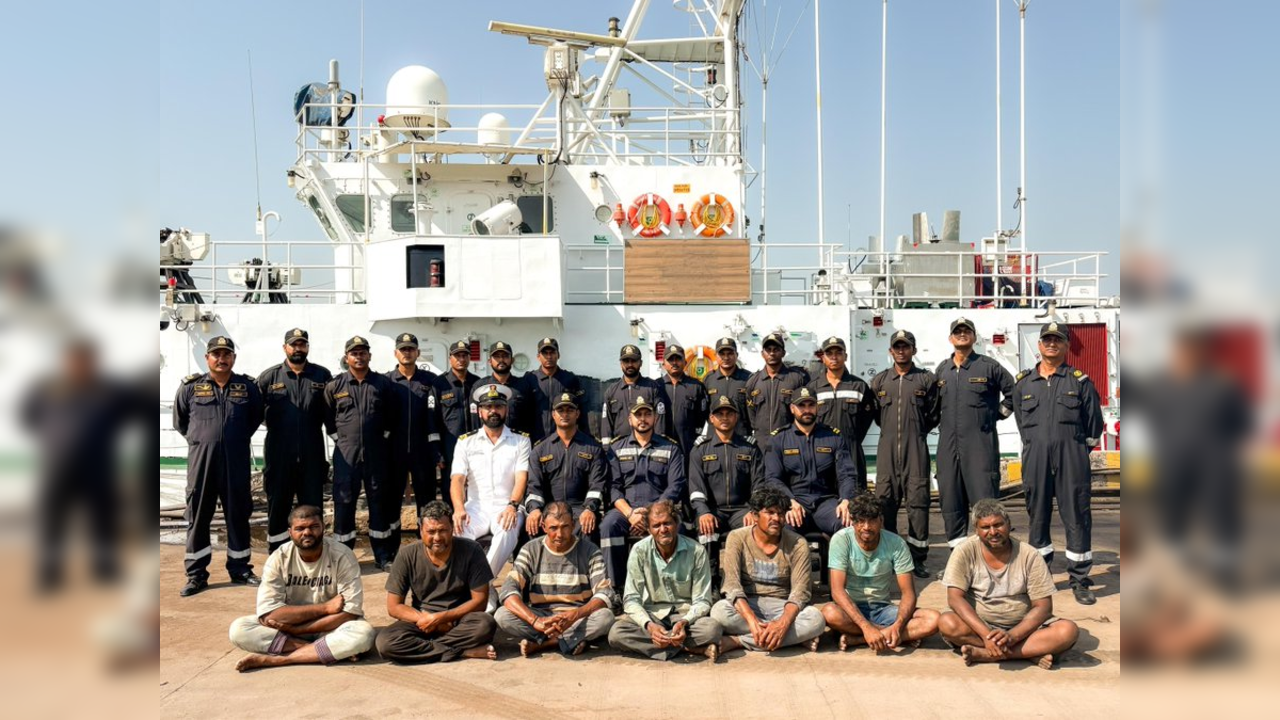 |
|
The recent high-seas encounter between the Indian Coast Guard (ICG) and the Pakistan Maritime Security Agency (PMSA) highlights the ongoing tensions and complexities of the maritime boundary between India and Pakistan. The dramatic rescue of seven Indian fishermen from the clutches of a Pakistani patrol vessel underscores the critical role played by the ICG in protecting Indian citizens and national interests within its claimed territorial waters. The incident, which unfolded near the disputed India-Pakistan maritime boundary, involved a tense two-hour chase between the ICGS Agrim and the PMSA ship PMS Nusrat. This pursuit emphasizes the volatile nature of this region and the potential for escalation in already fraught relations. The decisive intervention of the ICGS Agrim, preventing the apprehension of the Indian fishermen, showcases the ICG's readiness and capability to respond swiftly and effectively to such situations.
The incident began when the PMSA vessel attempted to apprehend the Indian fishermen who were aboard the fishing boat Kaal Bhairav. The ICG's prompt response, culminating in a high-speed chase, prevented the Pakistani authorities from taking the fishermen into custody. The ICG's assertive actions serve as a strong message of India's commitment to protecting its maritime sovereignty and its citizens within its claimed jurisdictional limits. The official statements released by the ICG emphasize the unwavering commitment to safeguarding the interests of Indian citizens at sea, irrespective of the geopolitical complexities involved. The firm stance adopted by the ICG during the chase demonstrates a clear intent to prevent any incursions or attempts at unlawful detentions within Indian waters.
The aftermath of the incident revealed the unfortunate damage and sinking of the Indian fishing boat Kaal Bhairav. While the fishermen were successfully rescued and found to be in stable condition, the loss of the vessel underscores the risks inherent in fishing operations in this volatile region. A joint investigation involving the ICG, state police, intelligence agencies, and fisheries authorities was launched following the incident, suggesting a comprehensive effort to analyze the events leading to the collision and subsequent rescue operation. This investigation will be crucial in understanding the exact circumstances and determining any potential responsibility for the damage to the Indian fishing vessel. The investigation's findings are likely to have broader implications for future maritime cooperation – or lack thereof – between the two countries.
This incident, while resulting in the safe return of the Indian fishermen, serves as a potent reminder of the underlying tensions between India and Pakistan, extending to their maritime boundaries. The potential for such confrontations to escalate is ever-present, underscoring the need for clear communication and potentially renewed efforts at establishing clear maritime boundaries or mechanisms to avoid such incidents. The ICG's role in this scenario not only involved the immediate rescue operation but also showcases the wider responsibilities it undertakes in maintaining maritime security, protecting fishing communities, and representing India's interests in the complex maritime environment of the region. The international implications of such incidents cannot be ignored either; it underlines the need for responsible behavior and adherence to international maritime laws in disputed areas. The actions of the ICG must be viewed within the broader context of maritime security challenges that require continued vigilance and a steadfast commitment to ensuring the safety of citizens and the protection of national interests.
Further analysis of the incident will likely focus on the specific circumstances surrounding the collision, the adherence to international maritime laws by both parties, and the underlying geopolitical factors driving the incident. This case study presents a valuable opportunity to examine existing maritime security protocols and assess their effectiveness in managing potential conflicts in highly contested waters. The international community might also review the event to assess whether current frameworks and agreements are sufficient to ensure the safety and security of fishermen operating in areas with overlapping maritime claims. Ultimately, this incident underscores the need for a more robust and collaborative approach to addressing maritime security concerns between India and Pakistan, potentially involving international arbitration or mediation to find lasting solutions to the issues of overlapping claims. The long-term implications of this event are far-reaching, impacting not only the immediate parties involved but also the wider regional security landscape and the international community's perception of maritime boundary disputes.
Source: Dramatic Mid-Sea Chase And Heroic Rescue: How India Saved Fishermen Caught By Pakistani Patrol
